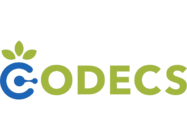CODECS – Maximising the CO-benefits of agricultural Digitalisation through conducive digital ECoSystems
Acronym: CODECS
Implementation period: 01/10/2022 - 30/09/2026
GA number: 101060179
Type of Project: Horizon Europe
Internet presentation: https://www.horizoncodecs.eu/

Project aim: The aim of the CODECS project is that through digitalization of farms and agricultural sector generates multi-level benefits: to increase productivity, to advance efficiency and quality of work, decrease pressure to the environment, and promote integration of producers with the market.
About the project: CODECS project co-develops, together with farmers and AKIS actors, user-friendly approaches, methods, and tools able to document the co-benefits and the costs of technologies applied to real contexts. In this way, it improves the collective capacity to understand, assess and foresee the full range of benefits and costs of farm digitalization, and to build digital ecosystems that maximise the net benefits of digitalization. CODECS develops a vision of “sustainable digitalization” which will contribute to a multi-level transition that links social, economic, and ecological aspects together, by adopting an innovative system based / actor centered approach, and an action research methodology based on coordination of 21 Living Labs through interdisciplinary teams. The research will study the role of ‘digital ecosystems’ in the rate of uptake of digital technologies and in the distribution of their costs and benefits; will develop and test three indicators (farmers’ digital readiness, scaling readiness, digital ecosystem conduciveness) to monitor the level of digitalization and foresee its potential costs and benefits. It assesses and compare the full range of social, economic, and environmental costs and benefits of farm digitalization, identifying synergies and trade-offs between different sources of costs and benefits; it will test and demonstrate digital technologies in 21 Living Labs through physical and virtual demonstration. The CODECS digital platform will host search, demonstration, and assessment tools. The BioSense Institute contributes to this project by creation of digital meta-inventory of digital technologies in use, as one of the key outcomes of the project. Also, the BioSense Institute is in charge for development of one Living Lab for research and demonstration of chosen technology in Serbia, all in collusion with domestic agricultural producers.
BioSense role on the project: BioSense have two-fold role on this project. One is to coordinate Serbian Living Lab which is implementing and testing application of sensoring technologies in the greenhouse vegetable production, with aim to assess all benefits and costs for the farmers and connected actors. The second one is to contibute to CODECS digital platform by creating comprehensive inventory of digital technologies used in agriculture at the European level and, thus, provide all interested parties to consider it and find the right ones for its own application scenarios.